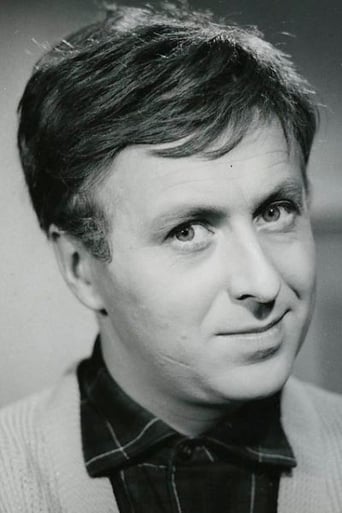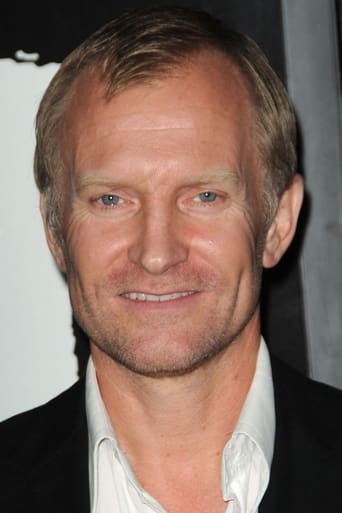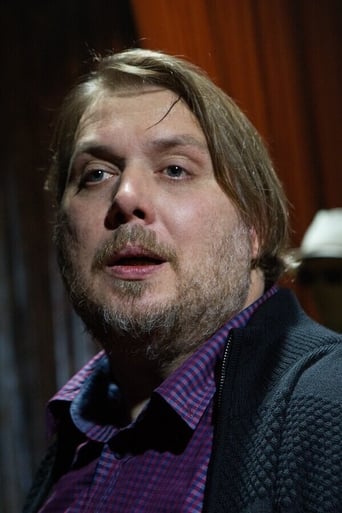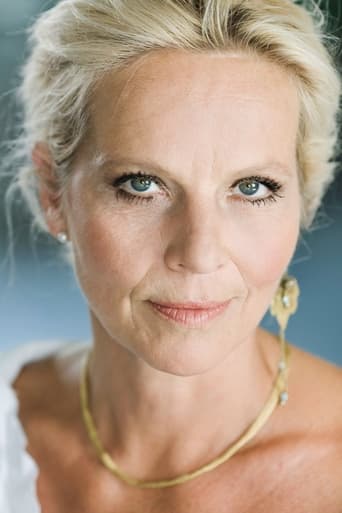Matialth
Good concept, poorly executed.
CommentsXp
Best movie ever!
TaryBiggBall
It was OK. I don't see why everyone loves it so much. It wasn't very smart or deep or well-directed.
Staci Frederick
Blistering performances.
johnnyboyz
Allegro is an ample Danish drama with redemption at its core, a film arriving with some extravagant ideas and some far reaching ambitions which, for the best part, combine reasonably well. The piece is a constructive and involving character study; a film with an uplifting politic at its core about identifying the importance of one's foundations and of where one came from and a film about the power of memory. Above all else, the film relies on a great deal of surrealism and generally off-kilter content to prop up what is a somewhat simplistic tale of one man returning to his roots so as to eventually confront past mistakes. In short, the surrealism here comes across heartfelt and necessary; it doesn't overwhelm the text as it does in something like Inland Empire. We, the audience, are not buried nor bombarded with a series of tricks or gimmicks – there are no near-unencryptable semiotics plaguing what might very well be a simple story simmering beneath the surface, although both shot and told by an individual too interested in bewildering and alienating. On the contrary, Allegro is passable science fiction applied to a digestible premise somewhat resulting in an enjoyable piece about a man returning to a place, in which he experienced mostly negative life experiences, to do good this time.Ulrich Thomsen plays the adult incarnation of Zetterstrøm, a young boy from Copenhagen when we first see him, whose snow cone always comes loose from its foundation only to fall on the floor and whose rides on fair ground attractions pack up the moment he gets on them, such is the hard-luck nature of his childhood existence. During these opening segments, of which are nicely animated, he additionally happens upon two things: the equally young Andrea (Christensen) and the creating of piano music. Andrea is good to him; a beacon of light where there was dark. Zetterstrøm then proceedings to abruptly terminate one of these two things, specifically Andrea's presence, when he up's and leaves to pursue his musical career in America in a black hearted fashion.As years roll by, and either party grow into adults; Zetterstrøm doing well as a musician in his field, Andrea staying where she is, something mysterious befalls a district of their childhood stomping ground, the Danish capital. Principally, a bizarre field of energy causes global news when it lands and both engulfs as well as surrounds a section of the city, thus trapping the people already in there and stopping those on the outside from entering. This part of Copenhagen is re-branded "The Zone", a place terrorising its inhabitants on arrival with bright reds and blue hues flashing around uncontrollably and housing what appears to be diegetic music sounding like the sort of stuff Steve Roach might compose on an off day.Fittingly, Zetterstrøm is due to return to Copenhagen for a concert stop; he departs America for Europe again, checking himself in his New York City hotel mirror in what is a telling moment of self-reflection in a literal sense with room to grow into a metaphorical one. Later, he will have to confront his own reflective self upon entering this "Zone" when the entering through a restroom mirror takes place. It is here the film mutates into a tale telling of his return, his curiosity and his uncanny interactions with an array of people; not least a glasses wearing man of some age whom seems to think getting Zetterstrøm into The Zone by any means would be a good idea. Further links to the aforementioned Lynch, creator of Inland Empire, rear up here when we think back to a similar character in his 2001 film Mullholland Dr. The writer/director for Allegro, a certain Christoffer Boe, whose ideas here frustratingly outweigh execution, at this point pumps his film with as much life as it ever possesses throughout; paying meek homage to Andrey Tarkovskiy's 1972 film Solyaris and eventually formulating his piece into a film about a guy heading into the unknown to try and tackle why it is certain things are happening - the stumbling across items much more personal and affecting than he first envisaged additionally rearing up.Allegro is good value for what it is, a story we are able to wrap ourselves up in; off-the-wall content which does what it's supposed to do and remain looming in the background as this central tract of a man righting wrongs takes centre stage. The sense of there being this respective infrastructure to a creative, avant-garde element inserted into proceedings which has its own effect on surroundings we are familiar with feels additionally persistent. There is enough of a sense of adventure as he attempts to seek Andrea, flitting between the inner and outer Zone locale, and whilst the film does not have the power nor the majesty I think it perhaps deserved, Boe strikes us as a creative and enthusiastic filmmaker – the sort of person unafraid of setting bars high but at the same time, both eager and able enough to stick to rigid ground level ideas of character study and generic frills. Here, they total up into a substantial film watching experience.
franramy
It was a big surprise that I gave this movie. When you think because a photograph is more important than a drawing, in the sense that the picture does capture a moment and freeze-it for all eternity, drawing, photography is made stronger, the film exploits this fact into something dramatically essential to put an omnipotent narrator in the argumentation, which is extremely interesting. Note that does not follow the structure of classical cinema, therefore understanding becomes a challenge, challenge for the viewer who expects to have more elements with which to rebuild those gaps that are present in the argument, leading to an environment discomfort that unfortunately tends to boredom. Ulrich Thomsen's performance manages to articulate a meaning of forgetting how wonderful, considering it's not just forgetfulness, but also, hate, despair and love. In history we find characters that make no sense, that seem to abound, or better yet, seems to be missing something, something like the memories of humans, so variable over time, but strongly tied to the music, which is extremely strong important to understand and feel this film.
oOgiandujaOo_and_Eddy_Merckx
I'm a big fan of existential folly in film, especially having completed many of my own. Zetterstrøm is the main character in this movie, a world-renowned pianist from Denmark. Since childhood, he is an assiduous "forgetter" of everything except his piano playing. This is to say that he stores up his disappointments, forgets them, and retreats behind a piano. After a love affair that ends due to his emotional constipation, he uses his facultative amnesiac skills once again, and this act is one step too far, so inimical to the fabric of reality, that a rent in reality is formed over three city blocks, and becomes referred to as the "Zone".Zetterstrøm buries himself in his solitary existence of piano-playing, quite literally performing concerts in the dark, or behind screens so that the audience cannot see him. Shadowy figures draw Zetterstrøm back to the zone, unwilling to allow his non-confrontational existence to continue. Zetterstrøm must be made to confront his past.It's a fascinating film, the narrator lets us know that it's Zetterstrøm's very brilliance which allows him to annihilate himself, that allows him to inoculate himself from reality.I'm in absolute adoration of films that attempt to make visual metaphors of the human mind, such a film is this (the Zone fulfils this purpose), Tarsem films such as The Cell and The Fall are others. There is no subject more sacred, more revelatory as regards human potential. There's a scene where Zetterstrøm sits and has dinner in an ornately plastered ballroom. The windows and floor are all blacked out with plastic sheeting, and the room is covered in latched boxes loaded on pallets, representing Zetterstrøm's repressed past, there's also a cage with globes of light in, recognising the potentiality of his mind.When there's narration we also see some very nice cartoons with Zetterstrøm as a child, that's another metaphor I'm very fond of from The Cell, that many of us are still children inside, just wounded, subdued, and with horrid barriers put up. You may have guessed that this movie moved me deeply.
tariboventola
Following the Cannes Camera D'or winner, "Reconstruction", Danish director Christopher Boe has made a new unusual film:Allegro Filmed primarily with hand-held camera, the picture is almost as gritty as some Dogme 95-movies. The camera is slightly shaky and keeps fast-zooming at faces all through the movie: Faces are important. Looks are important. Ulrich Thompsen (The Celebration) is the main character, the pianist Zetterstrøm, who is the person, around whom the film centers. Zetterstrøm is not really living life and playing piano, rather he is playing piano and living life through his piano. He is the archetypical introverted person, who lives in his own world, keeping distance to other people and of course love. A chance meeting with a beautiful woman, played by Danish supermodel Helena Christensen, alters his life, but his unbalanced self cannot truly recognize or accept his own feelings, so they part.10 years later - the movies starts. A voice-over by Henning Moritzen (The Celebration, Cries and Whispers) tells us that Zetterstrøm has forgotten about his past, that he is even more secluded from the world of feelings and drawn into perfecting his piano playing. The Voice-over is also a character in the film - Tom, in all probability some fictitious person made by Zetterstrøms own mind. Tom wants Zetterstrøm to retrieve his lost memory. This is the central quest of the film.Materialized in the middle of Copenhagen is The Zone - the area, where Zetterstrøm and the woman parted has now turned into a deserted zone, where people can't enter. The "walls" of the zone can't be entered. The Zone is a picture - something you can see, but not touch. The Zone is Zetterstrøms memory, his past.An abstract story now unfolds, as Tom and his assistant invites Zetterstrøm back to Copenhagen, where he gets the chance of entering The Zone. On a semi-realistic level, Zetterstrøm returns to Copenhagen to play a concert - and this mix of abstraction, materialized psychology and realism continues throughout. --The voice-over is constantly guiding us, but as it is also analyzing the immediate situation for us, we as audience have to think ahead of it; There's more to the film, than the voice-over tells us. The mood is very dark, very abstract - the intro somehow reminds of Bergmans "Persona", although not as Freudian in it's symbols - and the film seems very focused. It has a nostalgic feeling to it - Zetterstrøm wandering alone in a secluded world, as walking in his own self. The symbols are everywhere - symbols of past, symbols of love, symbols of frame of mind. It's very scary, although funny at certain points - the script is done by Danish stand-up comedian and quite intelligent-wise gifted, Michael Wulff (who worked with Boe on an Art House comedy-series called "Kissmeyer Basic"). The humour may be thought of as getting the mood in imbalance one or two times, but otherwise it's quite nice.The acting is superb. Ulrich is playing his favourite kind of role - introverted, mostly quiet and Bill Murray-like, sometimes shouting. His play opposite Helena, making her debut on the big screen, is fabulous - she really has the perfect eyes and voice for this dream-like character. Also Henning Moritzen is perfect as The all-knowing guy, who is teasing us.Not flawless, but this movie is yet an interesting film from the new major upcoming danish film director, Christopher Boe.Highly Recommended: 8/10



